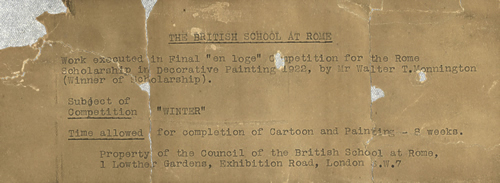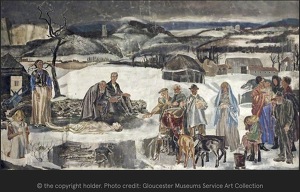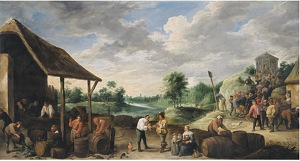

 Hover over the painting to magnify (there may be an initial delay while the magnified image is loaded)
Hover over the painting to magnify (there may be an initial delay while the magnified image is loaded)Sir Thomas Monnington (1902-1976):
Winter
Framed (ref: 1526)
Oil on canvas
See all works by Sir Thomas Monnington oil allegory 1.BSR 1.PORTRAIT OF AN ARTIST Quattrocenta RELIGION
Provenance: The British School at Rome, Lowther Gardens, London; Sotheby's, London 14th October 1987, lot 118, purchased by Abbot and Holder; Alan and Susanna Powers
Exhibited: Exhibition of works submitted in the final competitions for the Rome Scholarship of 1922, Royal Academy, February 1923; International Exhibition of Modern and Decorative Industrial Art, Paris, April-October 1925, British Section, Grand Palais (309)
Literature: Illustrated London News, loth March 1923, vol.162, p.366, (Reproduced)
Llewellyn, Sacha, and Paul Liss. Portrait of an Artist. Liss Llewellyn, 2021, p.344.

Winter was Monnington's winning submission for the 1922 British School at Rome Scholarship in Decorative Painting. The landscape is based on studies looking towards Clerebury Rings near Salisbury, undertaken during visits in 1921 to the artist's cousin Dr. R. C. Monnington. In a review in the Observer, (22 February 1923), P. C. Konody praised Monnington's painting for being steeped in the best traditions of the Italian Renaissance. His colour is dull, but there is a marked sense of style in his design. Joyce Smith (1896–1974) was one of the other finalisits - her submission bears all the trade marks of a Slade student composition with its frieze like figures and references to old master paintings.

A link with the Italian Renaissance can be demonstrated more specifically in relation to the work of Piero della Francesca: the young peasant leaning with both hands on a spade is a possible echo from the Discovery and Proving of the True Cross (San Francesco, Arezzo). The man sitting on a rock in the middle of the composition appears to be based on the figure of St.. Joseph (in reverse) in Piero della Francesca's Adoration.
Monnington might also have been influenced by the tradition of Allegorical Landscapes in Dutch 17th Century paintings:

We are grateful to Professor Luciano Chelles for assistance
 Rome Scholars
Rome Scholars




